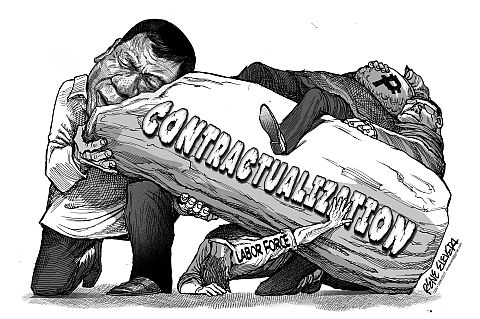
There’s something to look forward to with President Rodrigo Duterte’s announcement of new programs for the country’s labor sector, particularly his proposed bank for overseas workers and promise to end contractualization once and for all.
At a gathering of labor groups in Davao City’s People’s Park, President Duterte went on a lengthy discourse to explain why he cannot just end contractualization with a snap of a finger since there is a law providing for its implementation.
At the same time, the President’s proposal for an overseas workers’ bank may at first look appealing, but it needs further study lest it ends up as yet another lucrative milking cow for those with vested interests.
Anyone who monitored the case of the coco levy fund, whose monies were used by businessman Danding Cojuangco along with other cronies of the late strongman Ferdinand Marcos, knows that it came from the sweat and tears of the coconut farmers who have yet to reap the full benefits from the said fund.
The country’s overseas workers have become the so-called modern heroes of the Filipino people, their dollar and foreign currency remittances keeping the country afloat for decades now.
An overseas workers’ bank may help them secure loans to help their families and probably give them a second option to ensure their future provided that the bank’s mandate and operation stays true to ensuring their welfare and the welfare of their families.
Again, the finer details of the proposal have yet to be threshed out; but this early, the Filipino people, especially those whose loved ones work abroad and send money to them, should examine it with more than just a fine-toothed comb.
In fact, they should hold their local congressman/woman accountable for studying said proposal to see if it is feasible in the first place.
If done well, the bank may help finance the workers’ dreams of setting up their own businesses in the country and help them settle down at home for good with their families.
On the other side of the labor/management spectrum, the President’s assurance that the country’s labor unions can help monitor the compliance of companies on the prohibition against “labor-only contracting” can get pretty messy if not handled by people who can be trusted by both sides.
Labor Secretary Silvestre Bello III’s resignation had been demanded by the militant labor groups, and his replacement won’t have an easy time conciliating the interests of both labor and business.
Overall, the work towards improving the welfare of workers still continues, but at least the President is listening and isn’t dismissive of their plight unlike his predecessors. Time will tell if his promises will be fulfilled.